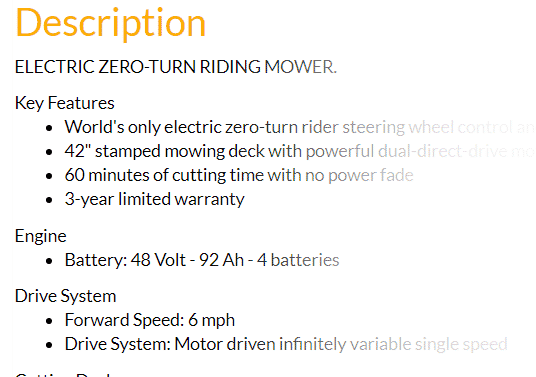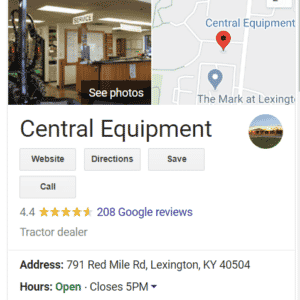Making your search result ranking higher isn’t as easy as pushing a few buttons. Search engines strive to create the best user experience possible, providing the most relevant, useful information based on the user’s search terms. If they didn’t, users would no longer rely on them for information.
This is good news for local dealers: the more relevant, informative and useful user experience you create on your website, the better the chances that search engines will serve your pages. By practicing good search engine optimization (SEO) habits, you can continually work to increase your search engine results position (SERP).
SERP is where your business appears when someone googles terms that are similar to your page. For instance, if you own a lawnmower dealership, and someone in your city googles ‘Lawn Mowers Near Me’ – you want your website to appear near the top. If it does, that means you have a high SERP.
Here are some top SEO practices for SERP success.

Website SEO practices:
Relevant keywords in text
Using a keyword tool can help determine which words will help attract the most visitors based on popular search terms that are already related to the topics you’re talking about on your website. Pick the most relevant, popular keywords for your business and try to include them.

Keywords should be placed in the text your site, on places where they’re relevant. Don’t just string “mower parts zero-turn dealership cub cadet sale” somewhere random – Google also takes into account the sentence structure. It needs to be integrated into descriptions and titles, and should feel natural that they’re there.
So, if you know you need those words included on the site somewhere, write a description for the Cub Cadet lawn mowers you have for sale. Something like “Cub Cadet’s high quality zero-turn mowers offers unbeatable power and comfort. We also offer OEM parts and repairs at our authorized service centers.”
Short, catchy and original title tags
Title tags describe what your website is all about while attracting the user’s attention enough to (hopefully) click through to your pages. Limit the title tag description to 55 characters so it will display well on SERPs. Keep title tags descriptive yet short and sweet to help crawlers and users determine the relevancy of your page.

Keywords at the beginning of page title tags
Google puts more weight on the start of the title tag, so try to keep the keywords at the beginning.
Keyword focused meta descriptions
The meta description appears under the title tag on SERPs and gives users a chance to learn more about your company before clicking into your site. Aim for a meta-description length of 150-160 characters.
Proper sitemap
Make sure your website’s structure is up-to-date and easy to navigate. The better the site structure, the easier search engine crawlers can find and index pages. Aim for a three-click rule—customers should find what they need on your site in three clicks or less.
Properly structured, SEO-friendly URLs
URLs help crawlers to figure out page topic and relevancy. Creating short URLs with your keyword in it, using “-” instead of “_” between words as well as static words (rather than numbers) will help users and crawlers read URLs faster and easier. Also, try to use sub-directory root domains instead of sub-domains.
Examples of SEO-friendly urls include:
site.com/top-10-zero-turns <— for a blog entry ranking your favorite zero-turn mowers.
site.com/repair <— for information about your service and repair center.
site.com/DIY-guide-for-mower-engine-repair <—Acronyms like DIY are well-known, and commonly searched for. If you know your audience may use that kind of acronym when searching, its ok to include.
UNFRIENDLY URLS would look like:
site.com/top10zeroturns <— search engines will see this as one word, and not see it as related to real words.
site.com/rep <— while YOU may know that ‘rep’ stands for ‘Repair’, search engines do not.
site.com/a2safbas8sb2p02b0 <— using an automatically-generated jumble of letters and numbers is not SEO-friendly.
Link internally with anchor text
Linking internally to your other web pages adds keyword-rich internal links to every page. Internal linking helps search engines crawl and index your site, provides readers with more reading options and improves ranking for some of your keywords.

Outbound links
Referencing and linking to reputable (authoritative) sources shows you are a helpful internet information steward that is willing to share pagerank. On the internet, helpful sharing is caring. Being part of the network of the internet. Internal and outbound links both impact SEO, and including references is a great way to show search engines you’re ready for a higher search ranking.
Website’s loading speed
Search engines do not like slow pages. Users will not wait long for a website to load. Strive for lickity-split load times.
This means paying attention to how big the files you embed in the pages are. If your file is super-huge, but still necessary, you may want to scale it down in size, or host it on another site like google drive or dropbox.
Really helpful content
Create relevant content on your pages that is easy to read, unique, helpful, fresh, and grammatically flawless. Your content should be so helpful and relevant that your target audience will want to stay on your page and others will want to share with their coworkers.
Blog articles with helpful tips and tricks, DIY guides, seasonal advice, and other ways to be educational are great things to offer to increase the amount of relevant traffic to your site.

Off-Site SEO practices
Search engine submission
It can take a while for search engines to find and crawl your site. You can help to speed up the process by submitting your website to popular search engines.
You can do this on google by going through Google’s Search Console.
Local directory submission
Submitting your business listing information to top or niche directories creates more places where users can find you and crawlers can confirm your business information. Be sure to submit NAP (name, address, phone number). And, if possible, website and category. A high percentage of searches are by keyword rather than business name, so strive to use category information wherever possible.

Social media marketing
Be present on all relevant social channels and manage your online reputation. Strive to get likes, shares and links by being 80% helpful and 20% promotional. This ratio may vary in certain times of the year, but it’s generally a good idea to focus on ways you can help your audience, because helpful, educational, and entertaining content is more readily shared.
Remember to keep a queue of content coming – it’s much better to be regular with two posts a month, rather than dump-and-run with 20 posts in the span of a few days, then nothing for a year.
Regular, less-frequent content gives people the expectation to be patient, while dump-and-run gives the impression that you USED to be active, but might have since died.
Remember to respond to comments! Even if it’s just ‘liking’ their comment, responding and answering questions makes you feel like part of a community – the cornerstone of what social media is all about.
Video marketing
Help users find out about your business by sharing your relevant and helpful videos on sites such as Youtube, Vimeo, etc.
Videos are a great way to show products in action, and to show what something really looks like in a way pictures can’t always capture.

Forums and communities
Answering questions in forums and communities can help to build your reputation as an industry expert. This can provide a possible opportunity to include your website or blog link if it is relevant to the answer.
Seems like a lot of work? Don’t worry! Dealers Digital offers SEO, Marketing, and Social Media services. Give us a call if you have questions! You can also read more about SEO, Social Media, and local marketing and advertising tips on our blog

